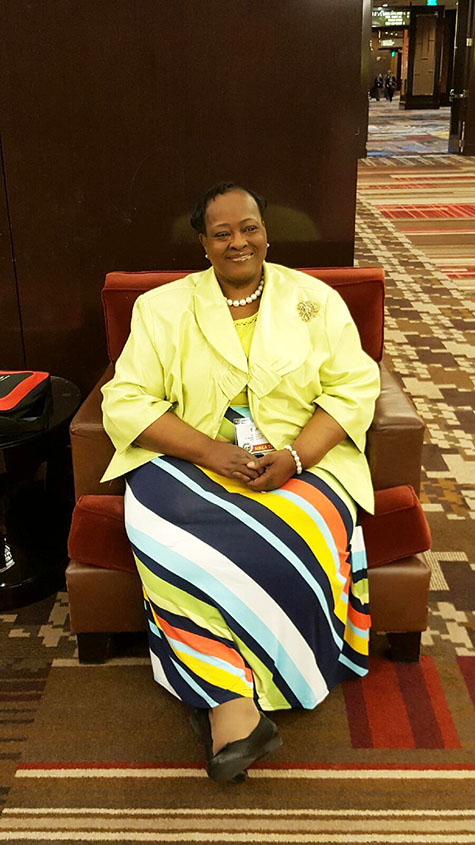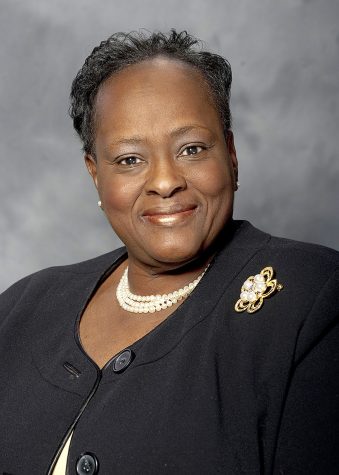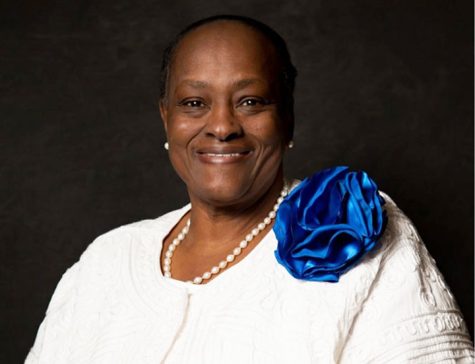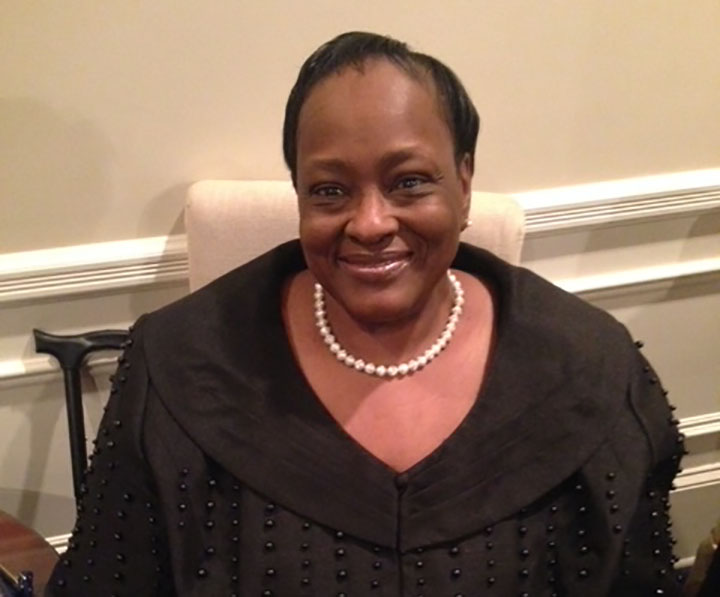Faulk urges students to get a true HBCU experience
Alumna and retired business education professor Emma A. Faulk, M.Ed., became one of the nine Black students chosen to begin the racial integration of Stanhope Elmore High School, founded in 1965.
July 15, 2022
Sometimes, faculty members rarely understand the impact that they can have on their students, until one day a student sends a note or returns to let them know just how significant their instruction, discipline or advice meant to them.
One such Alabama State University retired faculty member is Emma A. Faulk, M.Ed., who was born Nov. 4, 1952, in the expanding city of Millbrook, Alabama. Located in Elmore County, Alabama, Millbrook is one of the fastest-growing towns in central Alabama. It is located about 10 miles from Montgomery.
Despite the town’s proximity to the capital of Alabama, Faulk came from humble beginnings in a family that “had just enough money and an overabundance of love.”
Born as one of three children to her parents Helen and Smith Abrams, her siblings include her sister Rebecca, Smith Jr., and Amos. Her mother worked as a cashier and a cook at a S. H. Kress & Company retail department store. She beamingly describes her upbringing as “happy and jovial,” as she recalls that as a young girl, she lived next door to her grandparents.

Admittedly, Faulk’s grandparents, Mariah and Henry Abrams, made quite an impact on her life and taught her the value of kinship and work.
“They never spoiled us, but they showered us with plenty of love and gifts when they could,” she said.
Her grandfather served in World War II and was under the command of the renowned Gen. George Smith Patton Jr. and Gen. Douglas MacArthur. Gen. Patton is regarded for his work as a United States Army general who commanded the U.S. Army in the Mediterranean theater of World War II and Europe after Normandy’s allied invasion in June 1944. Gen. MacArthur was an American general who commanded the Southwest Pacific in World War II.
“As a child, I would enjoy listening to my grandfather talk about his time in the war and his experiences on the beaches of Normandy,” she said. “People from all over the community would gather on my grandparents’ porch and just talk. All the children in our area were family, and we played all types of games as kids, like softball and dodgeball. My grandfather passed away at 104 years-old, so he lived a very long life.”
In her adolescent years, Faulk took up many interests, such as sewing, which she learned from her junior high school home economics class and braiding the hair on her dolls.
“Back then, we learned how to braid hair by taking a Coca-Cola bottle and the corn silk that comes from shucked corn,” she begins. “The hair would be all types of beautiful colors. We would take the cork and stick the hair down into the bottle, and once it was secure, we would practice braiding and decorating our dolls’ hair.”
When asked what her favorite type of doll was as a young child she jokingly remarked, “I’m 69 years old, and we didn’t have many options back then. I guess I can say I had a Coke bottle as a doll.”
Faulk’s transition into young adulthood was quite remarkable as she became one of the nine Black students who were chosen by their parents to begin the racial integration of Stanhope Elmore High School, which was founded in 1965.
Despite the unanimous decision of the 1954 Brown v. Board of Education case in which the U.S. Supreme Court ruled segregation in public schools as unconstitutional, it was not until the late ‘60s that it personally impacted Faulk and the lives of other Black school children who resided in Millbrook.
“Originally, I was attending junior high school in my community at a school they called Sand Town School,” Faulk said. “In the late ‘60s, they wanted to integrate a new school in Millbrook named Stanhope Elmore High School. The first year of integration, they enrolled four Black students. I enrolled the following year along with my cousin and some more friends. Eugenia McKiethen, Carolyn Oliver, Esther Oliver, and myself were the second group to integrate Stanhope. There were less than 10 Black students there, all Black women who were starting this integration process.”
Faulk credits her knack for perseverance with her time spent at Stanhope Elmore High School. During the first two years, Faulk and the other African American students were constantly ridiculed and ignored by students, and the faculty did not go out of their way to help.
“It’s actually my 50th anniversary of graduating from Stanhope Elmore,” she said. “I graduated in 1971. I was talking to my mother recently about why we were made to sit in the front of the bus on the way to school. She reminded me that we were made to sit in the front because children were spitting and throwing things at us when we sat in the back. I recall several times when my bus driver would see us running to catch the bus and would drive off without waiting. The Lord is with us every day, but I needed to have these experiences to learn strength and how to stand on my own.”
The students found themselves avid followers of Martin Luther King Jr.’s, DVM, message of nonviolence and did not respond to the cruelty they faced daily. The torment carried on into the classroom, as well as the overt racism that Faulk experienced, speaks to her tenacity.
“How many students could stand being called a ‘nigger’ every day? How many students could stand being in a classroom where no one spoke to them all day long, not even the teacher. No one wanted to help you, and so we had to do the work on our own,” she said. “My mother supported me and inspired me to continue on by letting me know that I had to be a mentor and a beacon of hope for other Black students who did not have the opportunity. You had to grow up quickly and have that endurance.”
Fortunately, once Faulk progressed through her years at Stanhope Elmore, new teachers who were willing to help, were brought on staff. Linda Wright and Thelma Parks served as two of her teachers during her senior year of high school.
“They were both wonderful women,” Faulk said. “Mrs. Wright was a preacher’s wife and although she was white, she was different from the others. Mrs. Parks was an extraordinary business teacher who truly cared for the well-being of her students. She was one of the sole reasons why I went into business education professionally.”
Despite the harsh social environment, Faulk impressively became the treasurer of her senior class, editor of the school newspaper, a member of the Beta Club, and remarkably she was one of four students who tied for the highest grade-point average of her class (two Black students and two white students). On her graduation day in 1971, she delivered a valedictorian speech in conjunction with the three other students.
After high school, Faulk explains that she had no idea what she wanted to do with her life. Surprisingly, she had not considered college until Parks made it possible for her to receive a full scholarship to Alabama State University.
She decided to major in business education and minor in economics.
“Mrs. Parks graduated from ASU, and it was because of her that I was able to go to college,” she said. “I’m still thankful to her to this day.”
Once on campus, it was no surprise that Faulk became very involved with Greek life and other extracurricular activities.

“I enjoyed ASU,” Faulk begins. “I became assistant secretary for the Student Government Association, a member of Zeta Phi Beta Sorority, Inc., and I was the president of Xperte Chapter of Future Secretaries Association (now called IAAP).”
When asked what her favorite memory of attending Alabama State University was, she humorously remarks that it is difficult only to choose one. However, she regards ASU as an institution that exposes students who have not had many opportunities in their lives to broader horizons by connecting them with the corporate world.
“You know what I loved about ASU is that they brought national figures to the university so that we could gain new opportunities and network,” she said. “I thought that was really beautiful. I was too enthused to see the university bring South African activist Winnie Mandela to speak,” she said. “Of course, I also enjoyed everything about Homecoming, and the Turkey Day Classic and I’ve always loved the band. When I was in school, there were only males in the band. There were no dancers or flag girls, and the band was still bad. The music department has always been amazing and when I was a student, Bertrem Martin was head of the theatre department. They would put on the most wonderful plays. I have so many amazing memories, but I truly respect the culture that the university provides for its students, staff and community.”
Martha Headley, Ed.D.,a former chair of the business education department, quickly became one of Faulk’s favorite professors due to her grace, professionalism, and passion that she taught with.
“Her knowledge inspired me greatly,” Faulk notes. “She truly believed in her students and gave us the tools we needed to succeed. At the end of the year, she would take her business students out to the park for a picnic. You could tell the business students apart from any other because Headley motivated us to carry ourselves with dignity. We were just different.”
Upon graduating in 1974, the dean of the College of Business, Major Lightfoot, opened another door of opportunity for Faulk to further her education. During her tenure as an undergraduate, Lightfoot received some material from Bowling Green State University informing him that they were looking for exceptional Black students in order to begin integrating their university.
“He called me into the office one day to try and convince me to go to Bowling Green,” she said. “At first, I was hesitant because I already had five job offers to teach, and my plan was to go straight into my career as an instructor at Pensacola, Escambia County schools. However, he persuaded me to continue my education and obtain my master’s degree. He sat with me and helped me complete my application, but I still had no money.”
Fortunately, Jacqueline Williams, Ed.D., then secretary to former ASU President Levi Watkins, informed the president that Faulk had a scholarship but no money to complete her master’s program. Out of the kindness of his heart, he provided Faulk with a summer job as an office clerk so that she could have money in graduate school.
“These are the type of people that you find at Alabama State University. The university has been a blessing to me. When I finished getting my master’s degree, I went over and spoke with Watkins, and I stayed to teach at ASU for 40 years. It wasn’t all easy. I was in my early 20s when I began teaching, and having older colleagues was difficult because they doubted my ability. I had to prove myself.”
Her time at Bowling Green State University taught her a lot about the importance of staying focused and having an attainable goal established. Faulk entered into the master’s program along with 99 other Black students. When she graduated, only about 27 of them were left.
“Don’t let bumps in the road deter you from excellence,” Faulk said. “You have to have perseverance. OK, so the day didn’t turn out well. Tell yourself, ‘I have to get up, wash my face and put on that smile.’ When you are hurting on the inside, it’s important to keep moving and stay focused on your goals.”
Today, Faulk encourages current students at ASU to be accepting of opportunities that can open another door to success. She explains that success can only be achieved with great sacrifice and urges them to stay motivated, despite the distractions they will face.
“Stay prepared,” she begins. “That may mean skipping out on a frat party or a football game. So many students lose sight of why they came here. Go to class and heed what your professors are instilling in you. Learn from their experiences and do the work. If you have an opportunity to complete an internship, take it. Opportunities are there, but you must decide that you want them.”

Faulk boasted about the excitement that she received from taking students to conferences and providing them excellent opportunities as the most rewarding aspect of her career.
In her personal life, Faulk enjoys spending time with her daughter who resides in Nashville, April Faulk Mannings (a human resource coordinator at Wellpath) and her husband Mikel Mannings (an IT medical specialist at Vanderbilt medical center) both graduates of Alabama State University. She recalls taking her daughter with her to conferences as a young child and the bond that they developed after traveling to places like Mexico and California together.
“I wanted to give my daughter the opportunities that I didn’t have as a child because I was poor, but I was happy. I would get permission from her school to take her with me to these conferences, and she would have to write reports on them. I recall one of her teachers being in disbelief of how well-traveled this little young Black girl was.”
Faulk retired largely due to a disability that afflicts her walking. Although she greatly desires the ability to visit ASU events and games, she is unable to do so at this time.
However, as a professional registered Parliamentarian, Faulk prioritizes staying connected with the university by informing young adults of the unique opportunities and the culture that awaits them here.
“I still love ASU,” Faulk declares. “When I talk to young people today, I encourage them to attend the university because that is an experience that you can’t get anywhere else. There is nothing like the HBCU experience. I keep up with the university’s academics, and I want ASU to continue to be a beacon of guiding light for those students that need to be in the nurturing environment that ASU provides. You may come to the university as a rough stone, but you will emerge as a precious gem.”







